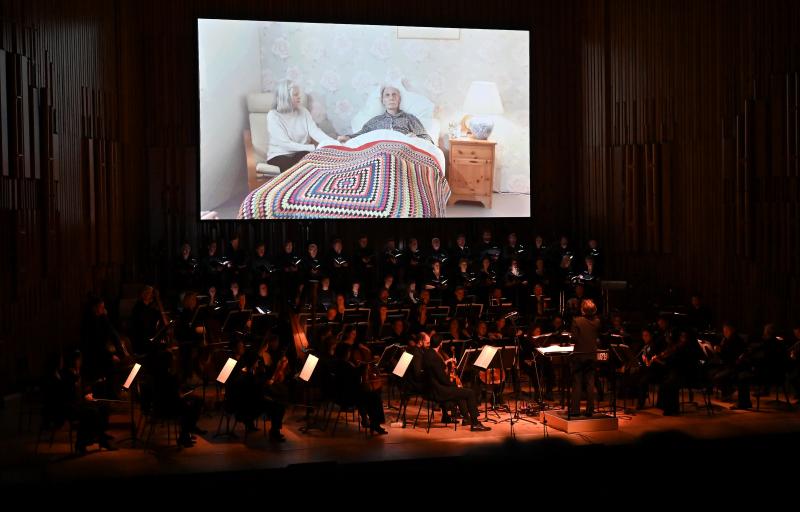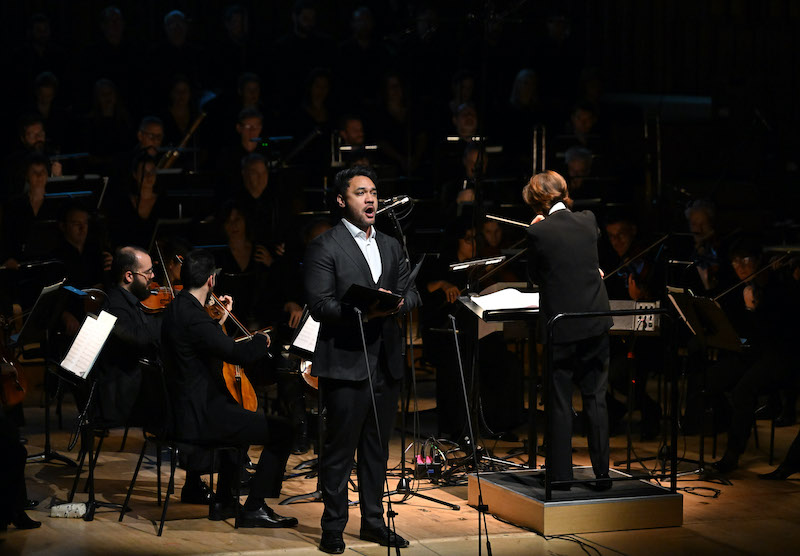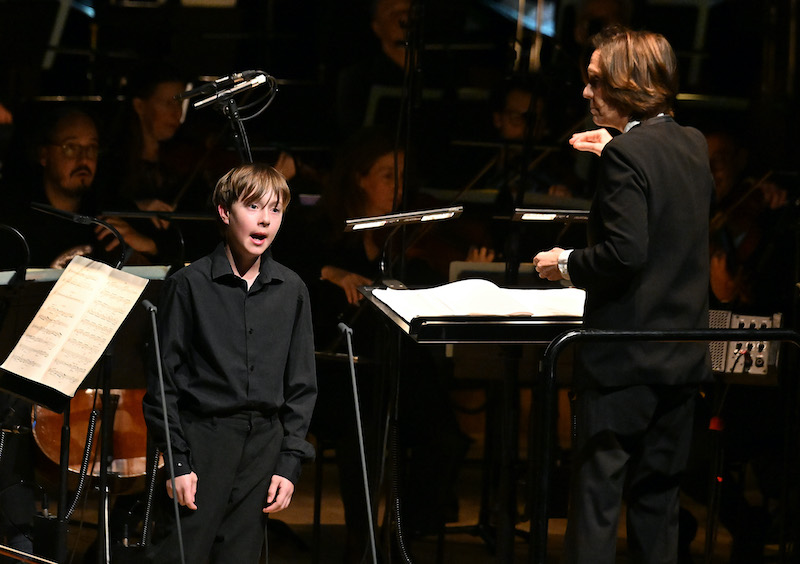Accentus, Insula orchestra, Equilbey, Barbican review - radiant French choral masterpieces | reviews, news & interviews
Accentus, Insula orchestra, Equilbey, Barbican review - radiant French choral masterpieces
Accentus, Insula orchestra, Equilbey, Barbican review - radiant French choral masterpieces
A familiar warhorse alongside a neglected curiosity

Last night saw two pieces of late 19th century French choral music – one a hugely popular staple of choral societies around the world, the other a complete novelty, lost for a hundred years – brought together in fascinating juxtaposition by the French period-instrument orchestra Insula, under their founding conductor Laurence Equilbey.
The Fauré Requiem and Gounod’s Saint Francois d’Assise shared a radiant contemplation of death in music that is at once highly refined and yet utterly direct. They were both, in their different ways, exquisite.
Equilbey is an innovative conductor both as the founder of Insula and accentus, last night’s choir, but also in her repertoire choices. I became aware of Insula in reviewing their CD of the symphonies of Louise Farrenc earlier this year and was keen to hear them live, as I found their period-instrument evocations of 19th century France very alluring. The generally less weight sound of the strings was counterbalanced by a generous number of desks, and the pungency of the horns and the buzz of the bassoons added distinctive colour. First up was the Gounod, premiered in Paris in 1891 and then lost till the manuscript was rediscovered in the 1990s, and recorded by Equilbey in 2016. There isn’t much Gounod heard nowadays in London concerts, and I’m not sure this is going to become a staple, but more because of its practical peculiarities than the music, which I adored. Its 20-minute duration focuses on a tenor soloist, here the splendid Amitai Pati (pictured above by Mark Allan) taking the part of St Francis, only occasionally accompanied by the choir: not a piece that will offer enough to choral societies. The hyper-religious tone of the text is ecstatic, almost uncomfortably so, although the string-dominated music remains grounded, tuneful and simply orchestrated, shaped sympathetically by Equilbey with a slightly schoolmistressy air.
First up was the Gounod, premiered in Paris in 1891 and then lost till the manuscript was rediscovered in the 1990s, and recorded by Equilbey in 2016. There isn’t much Gounod heard nowadays in London concerts, and I’m not sure this is going to become a staple, but more because of its practical peculiarities than the music, which I adored. Its 20-minute duration focuses on a tenor soloist, here the splendid Amitai Pati (pictured above by Mark Allan) taking the part of St Francis, only occasionally accompanied by the choir: not a piece that will offer enough to choral societies. The hyper-religious tone of the text is ecstatic, almost uncomfortably so, although the string-dominated music remains grounded, tuneful and simply orchestrated, shaped sympathetically by Equilbey with a slightly schoolmistressy air.
The Fauré is obviously much more familiar territory, heard here in the final 1900 version, in the premiere of which Fauré himself conducted a choir of 250. The forces here were much more modest, thankfully: the 35-strong accentus sounded distinctively French, although I couldn’t quite put my finger on what that sound was. Perhaps it’s just the vowels? The soloists were anglophone, though: baritone John Brancy had a sombre gravity and a dash of menace in the “Libera me”, and thirteen-year-old Oliver Barlow (pictured below), who gave a nerveless and engaging “Pie Jesu”. I was more ambivalent about the specially commissioned Mat Collishaw film that accompanied the Fauré. It began as a sequence of deathbed tableaux, family members holding hands at vigils with dying elders. These were moving depictions of the last moments of life, with the consolatory mood that pervades Fauré’s music. Then, in a jarring change of tone, the bodies were carried to the top of a rundown apartment building where they were brutally dismembered by some laughably unconvincing CGI vultures. Apparently this was a nod to the Tibetan tradition of “Celestial Burial” but it felt gratuitously gruesome and provocative, in proper YBA style (Collishaw exhibited at both Freeze and Sensation, back in the day). I didn’t like it.
I was more ambivalent about the specially commissioned Mat Collishaw film that accompanied the Fauré. It began as a sequence of deathbed tableaux, family members holding hands at vigils with dying elders. These were moving depictions of the last moments of life, with the consolatory mood that pervades Fauré’s music. Then, in a jarring change of tone, the bodies were carried to the top of a rundown apartment building where they were brutally dismembered by some laughably unconvincing CGI vultures. Apparently this was a nod to the Tibetan tradition of “Celestial Burial” but it felt gratuitously gruesome and provocative, in proper YBA style (Collishaw exhibited at both Freeze and Sensation, back in the day). I didn’t like it.
And I’d prefer to focus on the music. The gorgeous “Agnus Dei”, recalling Bach in the way the orchestral melody is set against the choir’s slow chorale, or the heavenly “In Paradisum”, carrying us ever upward and upward. And the effortless euphony of the Gounod, which I will certainly return to listen to – but don’t expect to hear again live any time soon.
rating
Explore topics
Share this article
The future of Arts Journalism
You can stop theartsdesk.com closing!
We urgently need financing to survive. Our fundraising drive has thus far raised £49,000 but we need to reach £100,000 or we will be forced to close. Please contribute here: https://gofund.me/c3f6033d
And if you can forward this information to anyone who might assist, we’d be grateful.

Subscribe to theartsdesk.com
Thank you for continuing to read our work on theartsdesk.com. For unlimited access to every article in its entirety, including our archive of more than 15,000 pieces, we're asking for £5 per month or £40 per year. We feel it's a very good deal, and hope you do too.
To take a subscription now simply click here.
And if you're looking for that extra gift for a friend or family member, why not treat them to a theartsdesk.com gift subscription?
more Classical music
 Anja Mittermüller, Richard Fu, Wigmore Hall review - a glorious hall debut
The Austrian mezzo shines - at the age of 22
Anja Mittermüller, Richard Fu, Wigmore Hall review - a glorious hall debut
The Austrian mezzo shines - at the age of 22
 First Person: clarinettist Oliver Pashley on the new horizons of The Hermes Experiment's latest album
Compositions by members of this unusual quartet feature for the first time
First Person: clarinettist Oliver Pashley on the new horizons of The Hermes Experiment's latest album
Compositions by members of this unusual quartet feature for the first time
 Gesualdo Passione, Les Arts Florissants, Amala Dior Company, Barbican review - inspired collaboration excavates the music's humanity
At times it was like watching an anarchic religious procession
Gesualdo Passione, Les Arts Florissants, Amala Dior Company, Barbican review - inspired collaboration excavates the music's humanity
At times it was like watching an anarchic religious procession
 Classical CDs: Camels, concrete and cabaret
An influential American composer's 90th birthday box, plus British piano concertos and a father-and-son duo
Classical CDs: Camels, concrete and cabaret
An influential American composer's 90th birthday box, plus British piano concertos and a father-and-son duo
 Cockerham, Manchester Camerata, Sheen, Martin Harris Centre, Manchester review - re-enacting the dawn of modernism
Two UK premieres added to three miniatures from a seminal event of January 1914
Cockerham, Manchester Camerata, Sheen, Martin Harris Centre, Manchester review - re-enacting the dawn of modernism
Two UK premieres added to three miniatures from a seminal event of January 1914
 Kempf, Brno Philharmonic, Davies, Bridgewater Hall, Manchester review - European tradition meets American jazz
Bouncing Czechs enjoy their Gershwin and Brubeck alongside Janáček and Dvořák
Kempf, Brno Philharmonic, Davies, Bridgewater Hall, Manchester review - European tradition meets American jazz
Bouncing Czechs enjoy their Gershwin and Brubeck alongside Janáček and Dvořák
 Solomon, OAE, Butt, QEH review - daft Biblical whitewashing with great choruses
Even a top soprano and mezzo can’t make this Handel paean wholly convincing
Solomon, OAE, Butt, QEH review - daft Biblical whitewashing with great choruses
Even a top soprano and mezzo can’t make this Handel paean wholly convincing
 Two-Piano Gala, Kings Place review - shining constellations
London Piano Festival curators and illustrious friends entertain and enlighten
Two-Piano Gala, Kings Place review - shining constellations
London Piano Festival curators and illustrious friends entertain and enlighten
 Echo Vocal Ensemble, Latto, Union Chapel review - eclectic choral programme garlanded with dance
Beautiful singing at the heart of an imaginative and stylistically varied concert
Echo Vocal Ensemble, Latto, Union Chapel review - eclectic choral programme garlanded with dance
Beautiful singing at the heart of an imaginative and stylistically varied concert
 Scott, Irish Baroque Orchestra, Whelan, RIAM, Dublin review - towards a Mozart masterpiece
Characteristic joy and enlightenment from this team, but a valveless horn brings problems
Scott, Irish Baroque Orchestra, Whelan, RIAM, Dublin review - towards a Mozart masterpiece
Characteristic joy and enlightenment from this team, but a valveless horn brings problems
 Classical CDs: Voice flutes, flugelhorns and froth
Baroque sonatas, English orchestral music and an emotionally-charged vocal recital
Classical CDs: Voice flutes, flugelhorns and froth
Baroque sonatas, English orchestral music and an emotionally-charged vocal recital

Add comment